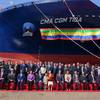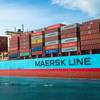Hempel Records Strong Year
Operating profit was up 36% to EUR 61 million from EUR 45 million and net profit was up 23% to EUR 37 million from 30 million for the same period last year.
With the higher levels of trade and construction activity worldwide, Hempel was able to increase volumes in litres by 9% over the previous year. The new volume also set a new record for a single year of 244 million litres for Hempel. The Protective business again in 2006 showed very encouraging growth in all markets, up 30% over 2005. Protective growth was especially strong within the Oil & Gas, and Wind segments, areas where Hempel has a lead position.
Overall Hempel’s Marine segment benefited from continued higher worldwide growth rates in 2006 with a 12% increase in sales. Across many vessel segments there was considerable demand throughout the year with order books full at yards across Asia and Europe. In 2006 Hempel launched innovative new products in Globic NCT and Hempadur Fibre 4760. The Container segment started slowly early in the year after a 22% demand decline in late 2005. The market then picked up in the spring and finished strongly in the second half of 2006. Hempel continued to focus on maintaining gross margins against raw material increases.
The Yacht segment saw a steady but limited growth in 2006. During the year Hempel introduced 2 new high-end products, Glide Speed and Glide Cruise, in the key markets of Germany, Greece, Norway, Spain and the Middle East. At the end of the year a new distribution agreement in France was announced with the sister company of Hempel’s German distributor. Decorative’s new strategy of working with major property developers in China worked well in 2006. Hempel Decorative continued the general positioning and strengthening of its brand with satisfactory results on sales.
Record increases in raw materials such as copper, zinc and crude continued to have a negative effect on gross margins. Efforts to absorb costs were made to the extent possible, and passing along the increases achieved limited success. The increased material costs have made it so Hempel was not able to maintain product margins.











